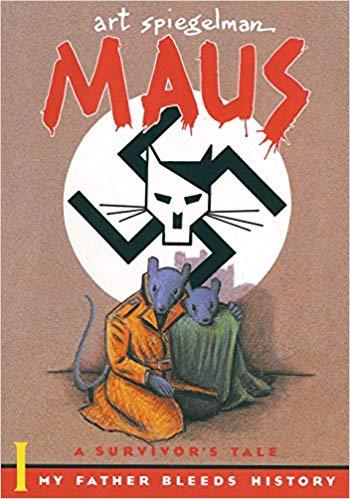Welcome back to our latest installment of By Teens, For Teens. This blog post series consists of all teen-generated content. This time we have two book reviews, both written by Jennings C., age 16. Both Maus and Lolita are considered classics, but they are very different from each other. We hope you enjoy!
Book Review:
 Maus: A Survivor’s Tale by Art Spiegelman
Maus: A Survivor’s Tale by Art Spiegelman
Rating: 5 out of 5 stars
Maus is unique among Holocaust literature for several reasons, but the most obvious is the medium in which it is written. The graphic novel format makes Maus more accessible to younger audiences who may be learning about the Holocaust for the first time. In addition, the graphic novel allows the author to use a visual metaphor that helps readers understand the constant fear that Jews in the 1940s lived under. The metaphor itself is rather simple: Jews are mice, Germans are cats. This is particularly fitting for the descriptions given of the hiding places some Jewish families made in the ghettos that the Germans forced them into, creating a game of cat and mouse.
Maus is not solely a Holocaust survivor’s memoir, however. It is, in equal part, a story of a man coming to terms with the traumas that his father went through, and how those caused behaviors, such as obsessive-compulsive organizing and hoarding food, that strained their relationship throughout his life. This, I think, is the other trait that sets Maus apart from many other Holocaust memoirs: its focus, not only on the horrors of the 1940s for Jewish people, but the generational effects the Holocaust had on families.
Overall, Maus is a disturbing and important reminder of the dangers of religious persecution, Fascism, and of the terrible human cost of those dangers. It is not necessarily enjoyable to read, but it is highly educational, and I would particularly recommend it to younger readers who are interested in the Holocaust, but may not be ready for something like the National Holocaust Museum. As an educational tool, and as a memoir, I would rate this book a solid five out of five stars.
Book Review:
 Lolita by Vladimir Nabokov
Lolita by Vladimir Nabokov
Rating: 4 out of 5 stars
Lolita is an interesting book for several reasons, not least of which is its narrator, Humbert Humbert, a European with an obsession over girls he refers to as “nymphets” who are between the ages of nine to thirteen or fourteen. Throughout the novel, you can tell that Humbert is a self-congratulatory, pompous, and self-assured prig. But to hear him tell it, he is irresistible, particularly to young girls, and is both insanely knowledgeable and humble. This general unreliableness keeps the reader from truly taking the narrator’s word for most events and can lead to some amusing lack of self awareness on Humbert’s part. One of the best examples of this is when he states that he is not an ostentatious man before dropping an unnecessary French phrase into a description of himself a sentence later.
Lolita’s plot, while unreliable, is nonetheless a mostly riveting tale. It is split into three main acts — Humbert Humbert’s childhood and migration to America from France and his seduction of Charlotte Haze (Dolores’s mother); Charlotte’s death and Humbert’s subsequent abduction of Dolores (who he nicknames Lolita) and their cross-country road trip; and Lolita’s eventual escape with a playwright and marriage to an oil worker and Humbert’s murder of said playwright and subsequent arrest. The selling point of Lolita is the first two acts, while the third act is a necessary wrapping up of the story, I feel that the book runs out of steam around the end of the second act and that the third is a bit of a slog to read.
The last thing that bears discussion about Lolita is the controversy surrounding its subject matter. Detractors will say that the book glorifies pedophilia when the opposite is true. While the narrator does seem to make excuses for Humbert Humbert’s sexual attraction to, and abuse of, Dolores Haze, one must remember that the narrator is also Humbert Humbert, and the most unreliable witness for a crime is often the one who committed that crime.
In conclusion, while Lolita is an excellent book, and certainly worthy of the classical status it has attained, I do find the last third to be rather dry, especially compared to the rest of the book.
If you would like to contribute to our blog or learn more about becoming a VolunTEEN visit https://rvalibrary.org/teens/volunteen/ for all the info and to apply!